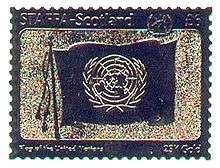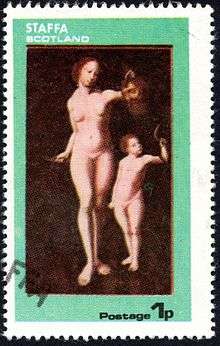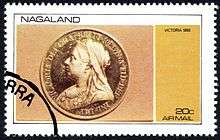Clive Feigenbaum

Clive Harold Feigenbaum (1939–2007) was a colourful and controversial British businessman who was involved in a lifelong series of scandals in the world of philately. Particularly notable was the sale of "gold" stamps from Staffa and his role in the collapse of attempts to list Stanley Gibbons on the Unlisted Securities Market in 1984.
Early life
Feigenbaum was born in 1939.[1] According to the biographical profile on the website of his firm Stampdile Limited, Feigenbaum started dealing in stamps as a child and had his own shop in Paddington by the age of 18.[2]
Expelled from The Philatelic Traders Society
In 1970, Feigenbaum was expelled from the trade body for stamp dealers, The Philatelic Traders Society, for selling "labels resembling stamps" without indicating that they were not genuine postage stamps,[3] though Feigenbaum claimed that he resigned from the body. The dispute turned on the status of the stamps that Feigenbaum produced and marketed which he termed British locals, similar to those produced for the island of Lundy, but which the PTS saw as little more than tourist souvenir labels. In 1984 Feigenbaum applied for re-admission but withdrew his application before it could be considered following adverse press comment about his business affairs. The Times reported that "Six leading stamp dealers have said they will resign if he is readmitted."[4]
Criminal charges
In 1971, Feigenbaum was charged with 14 counts of receiving and dishonestly handling stamps and proofs stolen from the British Museum. James A. Mackay, a curator at the museum, and George Base were also charged in connection with the same matter and it was from Mackay that Feigenbaum had received the stolen items.[5] Mackay had exchanged the proofs for Winston Churchill themed stamps.[6] Feigenbaum, who had denied the charges, was cleared on the judge's direction. The affair sparked a review of security at the Museum and the police officer who investigated the thefts, Bob Schoolley-West, subsequently joined the Museum staff.
Nagaland, Eynhallow and Dhufar
Feigenbaum is believed to have been behind the issue of stamps supposedly from the Indian state of Nagaland in the 1970s[7] and 80s. Gold stamps, similar to those of Staffa, were also produced for Nagaland. In 1985, Phillips auctioneers disposed of bulk lots of Nagaland, Eynhallow and Dhufar in their 26 September sale, causing Gibbons Stamp Monthly to comment: "...not the sort of material one normally associates with Phillips sales. Most were offered in considerable quantities (several thousand), estimates were very low".[8] Stamps of Staffa, Nagaland, Eynhallow and Dhufar are still commonly found together in collections today, indicating their probable common origin.
Staffa Island

In 1979 Feigenbaum became involved in a dispute with the U.S. Customs Service about whether 20% duty applied to 'gold' stamps of Staffa imported into the United States. The stamps were to commemorate the United States Bicentenary and were in sets of up to 13 priced at $20 each, the total retail price of the stamps being $5.2 million. Feigenbaum argued that as Staffa had a legitimate mail service the stamps were not liable for the duty. However, the mail service at Staffa, a remote uninhabited Scottish island, actually amounted to no more than a mail box on a jetty where letters could be mailed back to the mainland, weather permitting. As no-one lived on Staffa and visitors were invariably from the mainland in the first place, it was doubtful whether the mail service amounted to anything more than a tourist curiosity. Feigenbaum had the right to produce stamps marked Staffa in return for a fee paid to the island's owner, who operated the postal service.[9]
Involvement with Stanley Gibbons
In 1984 Feigenbaum attempted to list Stanley Gibbons, of which he was Chairman, on the Unlisted Securities Market in London but the attempt failed after newspaper disclosures about his previous business problems.[10] The Times described the attempted float as "disastrous" and reported Feigenbaum's resignation as Chairman of Stanley Gibbons shortly thereafter. The London Stock Exchange had refused to allow dealings to begin and Managing Director David Stokes was quoted as saying in The Times that "...the press comment obviously ruined the reputation of Mr Feigenbaum in the eyes of the Stock Exchange."[11] Feigenbaum sold his approximately 13.4% stake in the company to companies controlled by Paul Fraser in 1989.[12]
Bernera Islands
In 1985, Feigenbaum returned to 'gold' stamps with a series on the life and times of H.M. The Queen Mother supposedly from the Scottish Bernera Islands. The stamps had a face value of £10 each and were marketed as "22-carat gold-embossed stamps".[3] The stamps were ostensibly to pay the cost of transporting a letter by boat to the British mainland where it entered the normal postal system once a Royal Mail stamp was applied. For comparison, the cost of a first class letter in 1985 was 17p and a second class letter 12p.[13]
Tanzania
In 1985, Feigenbaum was the organiser of stamps of Tanzania to mark the 85th birthday of H.M. The Queen Mother.[3] The stamps had to be reprinted when it emerged that the original designs were marked "85th Year of H.R.H. The Queen Mother" rather than "85th Birthday of H.M. Queen Elizabeth The Queen Mother". The stamps, printed by Holders Press, were eventually issued in corrected form on 30 September 1985 while the original printing was not issued in Tanzania.[14] The British Crown Agents recommended that the original stamps be destroyed,[3] however, they continue to be available on eBay and through stamp dealers. Holders Press went on to produce a number of further stamp issues for Tanzania.
Tax shelter schemes
In the mid-1980s Feigenbaum, and companies he and his associates controlled, were named in litigation relating to tax shelter schemes in the United States. The companies controlled included companies registered in Liberia for tax reasons.[15][16] According to The Sunday Times, Feigenbaum and others had created a complicated scheme involving what they called "stamp masters" (printing plates) used for producing stamps of Scottish islands, which were transferred between a succession of companies in order to obtain a tax advantage. The judge in the case, Whitman Knapp, described the arrangements as "abusive tax shelters" and a "conspiracy to perpetrate a tax fraud".[17]
The ruling of Judge Knapp was upheld on appeal and the appeal judges commented that the "...meaning of his decision comes through loud and clear--the tax shelter sold by the appellants was a sham and the appellants knew it." The appellants were enjoined from continuing to offer the Philatelic tax shelter for sale.[16]
Tuvalu
In the late 1980s, Feigenbaum, as Chairman of the Philatelic Distribution Corporation was involved in a complicated legal case alleging fraud in relation to a contract with the government of Tuvalu, formerly the Ellice Islands, relating to the deliberate production of stamps with errors for sale to collectors at inflated prices. According to the New York Times, "P.D.C. produced 14,000 deliberate errors: stamps with inverted centers, missing elements or perforation varieties, which it sold for inflated prices".[18][19]
In May 1989, the British High Court ordered Feigenbuam to hand over all stocks of Tuvalu stamps after the island authorities claimed that he was printing stamps without permission. British police had already seized 7 million stamps of which 1.5 million were thought to contain errors. Feigenbaum was accused of not complying with the court order in June 1989 and the Tuvalu Attorney General, David Ballantyne, asked that Feigenbaum be imprisoned for contempt of court. He was fined £3,000 and sentenced to jail but immediately released on bail pending an appeal.[20][21] The appeal was heard in October 1989 when the fine for £3,000 was upheld but the jail sentence and costs of around £100,000 were set aside. The case made The Times law reports.[22]
The matter eventually came to a head in a 1992 fraud trial when, after two months of evidence and weeks of legal argument, Feigenbaum was cleared on the judge's direction as there was insufficient evidence to convict.[23] Feigenbaum argued that he had contractual permission to produce the varieties.[24]
Format International
.jpg)
Format International Security Printers Ltd. (FI), founded in 1967, was responsible for producing all the stamps handled by the Philatelic Distribution Corporation and its predecessors Philatelists Limited and Philatelists 1980 Limited. Feigenbaum was Chairman from 1988 until the firm was liquidated in mid 1990.[19] FI printed stamps for a number of Commonwealth countries amongst which were the controversial "Leaders of the World" series and, allegedly, stamps containing deliberate errors - the subject of the Tuvalu court case referred to above.
Star Wars and Teletubbies stamps
In 2001, Stampdile Limited was fined £5,000 at Harrow Magistrates Court for supplying "Star Wars" and "Teletubbies" stamps which breached trademarks laws. Clive Feigenbaum was fined £1,500 personally over the same matter.[25]
Easdale
Feigenbaum was the major landowner on the island of Easdale in the west of Scotland, for which one of his firms produced "stamps" of doubtful validity. The island website, now defunct, commented in 2002 that the stamps were "...certainly not used for postage on this island, or in the UK."[26] Feigenbaum bought his interest in the island for £300,000 in the early 1990s with an eye to producing stamps with the Easdale name. His efforts were not always appreciated, however, and Frances Shand Kydd, mother of Diana, Princess of Wales, threatened to sue Feigenbaum in 1998 after he produced a stamp of Diana meeting Mother Theresa. One local was quoted in The Sunday Times as saying "It is bloody embarrassing at times, he sells these stamps to the Japanese. We even had the Japanese ambassador phoning to complain that Japan's emperor was featured on one. [Bill] Clinton and [Monica] Lewinsky were on another."[27][28]
Following Feigenbaum's death in 2007,[2] the ownership of the common land on the island passed to his son, Jonathan.[29]
Other interests
Feigenbaum was a keen rugby and cricket player. He was a past Chairman of the Belmont & Edgware Cricket Club, a Jewish cricket club in Hertfordshire, England.
References
- ↑ England & Wales births 1837-2006 Transcription. findmypast. Retrieved 31 January 2015. (subscription required)
- 1 2 About Stampdile Limited. Stampdile Limited. Retrieved 26 August 2012. Archived here.
- 1 2 3 4 Royal stamps issue fails to pass muster by Michael Horsnell in The Times, 14 August 14, 1985.Archived here.
- ↑ Stanley Gibbons faces writ for £45,000 from dealer by Jonathan Clare in The Times, 4 April 1984, p. 17.Archived here.
- ↑ "Curator and stamp dealers accused" in The Times, 23 December 1971, p.3.
- ↑ "Stamp expert fined for thefts from museum" in The Times, 6 September 1972, p.3.
- 1 2 McInnis, Larry (1984-05-12). "Dealing in gold local labels brings down Gibbons head". Stamps. The Montreal Gazette. Retrieved 2010-02-26.
- ↑ "Stamp Market" in Gibbons Stamp Monthly, Vol. 59. No. 9, February 1986, p. 17.
- ↑ "Philatelic storm breaks over isle" by Ronald Faux in The Times, 24 November 1979, p.4.
- ↑ Levene, Tony (2002-06-15). "Stamps are easily licked". Money. The Guardian. Retrieved 2010-02-26. Archived here.
- ↑ "Chairman resigns at Stanley Gibbons." by Jonathan Clare, The Times, 7 April 1984, p. 21, Issue 61800.
- ↑ "Newsdesk: Stanley Gibbons Share Deal" in Gibbons Stamp Monthly, October 1989, p. 9.
- ↑ Stamp prices: how have they changed since 1980? by John Burn-Murdoch, 27 March 2012. Archived here.
- ↑ Stanley Gibbons Commonwealth Stamp Catalogue: East Africa with Egypt & Sudan. 2nd edition. London: Stanley Gibbons, 2010, p. 83. ISBN 0852597665
- ↑ "United States of America, Plaintiff-appellee, v. Philatelic Leasing, Ltd., Melvin Hersch, and Hambrosestamps, Ltd., Defendants-appellants". Cases.justia.com. 1986-06-26. Retrieved 2010-02-26. Archived here.
- 1 2 "Joseph M. Newmyer, John W. Kwiatkowski, John C. Collins and Tobin R. Collins, (88-1345) Plaintiffs-appellants, v. Philatelic Leasing, Ltd., et al., Defendants-appellees, Edward O'Connell, (89-1288) Plaintiff-appellant, v. Philatelic Leasing, Ltd., et al., Defendants-appellees". Cases.justia.com. 1989-11-27. Retrieved 2010-02-26. Archived here.
- ↑ "US judge stamps on fraud - Knapp accuses Feigenbaum" by Tony Levene in The Sunday Times, 18 August 1985. Retrieved 30 September 2012 from newsbank.com
- ↑ Healey, Barth (1989-08-27). "Stamps". New York Times. Retrieved 2010-02-26. Archived here.
- 1 2 Cannon, Brian. "Tuvalu and the leaders of the world - A philatelic scandal". Tuvalu stamps. Tuvaluislands.com. Retrieved 2010-02-26. Archived here.
- ↑ "Stamp dealer in court - David Ballantyne" in The Sunday Times, 18 June 1989.
- ↑ "Stamp sentence - Clive Feigenbaum" in The Sunday Times, 30 July 1989.
- ↑ "Director can be punished for contempt by his company - Law report" in The Times, 24 October 1989.
- ↑ "Six acquitted in stamp fraud trial" by Peter Victor in The Times, 1 July 1992.
- ↑ "Stamp expert is cleared of fraud charges" in Harrow, Pinner & Stanmore Observer, 23 July 1992, p. 7. Archived here.
- ↑ Stamp fines. Harrow Times, 4 April 2001. Archived here. Retrieved 7 October 2012.
- ↑ The Easdale Island Stamps at the Wayback Machine (archived May 5, 2002). easdale.co.uk, 2002. Retrieved from the Internet Archive, 29 September 2012.
- ↑ "At home on 'roof of the world'" by Stephen McGinty in The Sunday Times, 19 September 1999. Retrieved from newsbank.com 30 September 2012.
- ↑ Bill Clinton & Monica Lewinsky stamps of Abkhazia from the Stampdile website September 2012.
- ↑ "Quarry slate still put to good use" in Aberdeen Press & Journal, 22 September 2012. Retrieved from newsbank.com 30 September 2012.
External links
- Stampdile Limited.
- Pages on "Format International Security Printers Ltd. and the archive" from Golowes Stamps.
